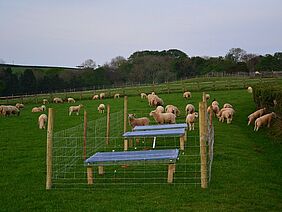The study investigated how management of grasslands across northern England modifies the transfer of recently photosynthesised carbon by plants to roots and soil organisms and the transfer of soil nitrogen to plant and soil organisms following a severe drought.
The team found that intensive management reduced the below-ground transfer of carbon photosynthesised by plants to roots and key soil biota. This impairs the capacity of carbon transfer belowground to recover to drought whereas under extensive, more traditional grassland management, this below-ground transfer of plant carbon to soil biota was less disrupted and hence more able to buffer the effects of extreme drought.
Mathilde Chomel, the lead author of the paper, said: “Soils contain a vast diversity of organisms crucial to key soil processes like carbon and nitrogen cycling. Our study shows that interactions between plants and soil organisms are vital for helping soil to resist to climate extremes, such as drought, which are already more common.”
Grasslands are under multiple threats including intensive management practices and extreme climatic events. A major challenge is to understand how these drivers interact to help inform sustainability policy aimed at protecting the multiple ecosystem services that grasslands provide and enhance their resilience to future climate change.
Mathilde Chomel said: "We hope that this research will help us to advise farmers and landowners to optimise the way they manage land to benefit from the living soil and improve how grasslands resist and recover from perturbations."
The findings are published in the prestigious international journal Nature Communications in a paper entitled "Intensive grassland management disrupts below-ground multi-trophic resource transfer in response to drought".
Mathilde Chomel is a scientific collaborator working on plant-soil interactions at FiBL France and a former postdoctoral research associate at The University of Manchester. The project involved an international team of researchers from the University of Manchester, University of Edinburgh, University of Dublin, University of Colorado, University of Amsterdam and Queen’s University of Belfast.
Further information
Contact
Link
nature.com: Article "Intensive grassland management disrupts below-ground multi-trophic resource transfer in response to drought"
Citation
Chomel, M., Lavallee, J.M., Alvarez-Segura, N. et al. Intensive grassland management disrupts below-ground multi-trophic resource transfer in response to drought. Nat Commun 13, 6991 (2022). https://doi.org/10.1038/s41467-022-34449-5




